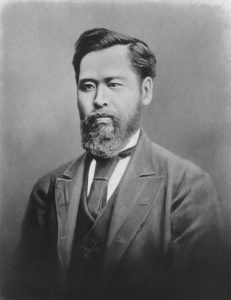Mori Arinori (1847-1889) was one of the most well known Japanese diplomats and scholars of his time. He was born in Kagoshima, Satsuma province, Japan in a family of samurai in the Kagoshima Clan. He studied within the clan school and at a Western studies school, which furthered his interest in the West. In 1865, he was one of the first to go abroad to the University of London and studied math and physics.
Eventually, Mori  and six other students traveled to the United States. Just two years after the Civil War, Mori lived in a utopian Christian community in upstate New York and worked in harsh conditions on a farm with the other samurai who had traveled with him. Mori and others stayed isolated from much of Christianity and the industrial revolution which was rapidly changing American lives. Mori ended up staying in the colony for several years, even when his faith and loyalty to Japan were questioned. He valued
and six other students traveled to the United States. Just two years after the Civil War, Mori lived in a utopian Christian community in upstate New York and worked in harsh conditions on a farm with the other samurai who had traveled with him. Mori and others stayed isolated from much of Christianity and the industrial revolution which was rapidly changing American lives. Mori ended up staying in the colony for several years, even when his faith and loyalty to Japan were questioned. He valued
his mentor, Thomas Lake Harris, and decided to stay in the states, following Christ, until the Meiji Restoration in which he was advised to return home. However, his Christian faith was often called into question as he rose to positions of power in Japan and he was often judged for his faith. Mori’s accounts of America were published in Mori Arinori’s Life and Resources in America.
When he returned in 1868, he was eager to spread Western ideas through Japan’s education system. He accepted a job as an officer in the new imperial government and eventually moved on to be a diplomat between Japan and the United States. In 1872, Mori had his first contact with Rutgers University, then known as Rutgers College. He sent letters to many U.S. universities in the hopes of finding out more about the American education system. His response from Dr. Murray at Rutgers College, who housed Japanese students at this time, was quite insightful and led to a formal relationship between the two as well as Japanese education reforms that were directly inspired by Rutgers College.
In 1873, Mori and 15 other scholars also established Meirokusha, to share Western ideas with the Japanese public. Mori was particularly passionate about spreading aspects of Western culture such as clothing, pastimes, and even proposed creating a Japanese version of the Latin alphabet. In 1885, Mori was appointed the first minister of education and aimed to reform primary school, middle school, and higher education to more closely resemble the organization of the Western education system. In 1889, Mori’s life ended because he was assassinated for allegedly desecrating a holy shrine of the Shinto religion.
Sources:
Duke, Benjamin. The History of Modern Japanese Education: Constructing the National School System, 1872-1890. Rutgers University Press, 2009.
Mori Arinori. (2019, August 19). Retrieved January 30, 2020, from https://www.britannica.com/biography/Mori-Arinori